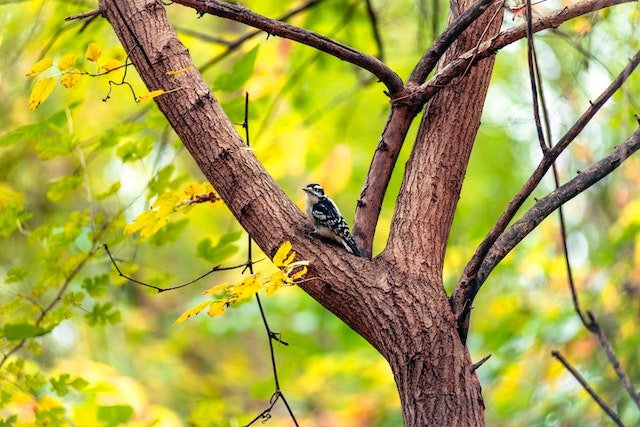Woodpeckers have long ignited the imaginations of cultures from all across the world due to their eclectic characteristics and behaviors. They are truly a rare species in-and-of themselves. Despite this, one misconception surrounding woodpeckers has taken over many urban legends: the notion that woodpeckers signify death. Through this article, we are here to set the record straight, demystifying woodpeckers and uncovering their true nature!
The Remarkable Significance of Woodpeckers in History
Woodpeckers, small but mighty birds, have captivated humans for centuries, drawing interest and admiration across continents and cultures. The woodpecker’s importance in global history can be traced back to ancient cultures and mythologies where these birds were endowed with powerful symbolism.
In Native American mythology, the woodpecker represented hope, healing, and protection. Some Pueblo communities believed that their drumming sound could reach divine spirits. The Greeks also revered this bird, portraying Zeus as an elusive woodpecker using its wings to escape his vengeful father, Cronus. Romans considered the woodpecker a beloved bird that signified victory in battles and wars.
However, in western medieval times, the woodpecker’s symbolism took on a different meaning. It became associated with the crucifixion of Christ as it was believed to have pecked at his cross.
While meaning has varied over time and cultures, many societies saw the woodpecker as a symbol of good luck, prosperity and wellbeing. Confidence was placed on the bird when better times were ahead. The Chinese interpreted its presence as a promise of good fortune and successful occasions.
Today, we can learn from this incredible bird by observing its way of life and habitat without the false truths perpetuated through time. It’s crucial we understand their behavior to take necessary steps for preserving our ecosystem including their natural habitats which are prone to destruction from human activities. In doing so, we not only protect these remarkable creatures but also contribute towards creating a more balanced and healthier environment.
Woodpecker Symbolisms – Discover The Meaning Behind Woodpeckers
Many cultures view the woodpecker as a sign of progress, opportunity and forward movement in life. Its rhythmic knocking can be taken as an urge to action or an indication that change is coming; alternatively, it might symbolize fresh opportunities just waiting to be grabbed.
However, the presence of a woodpecker can also serve as an alert in certain cases. It could indicate that something needs your immediate attention or that you must let go of old habits and beliefs that are holding you back.
The red feathers on the crown of a woodpecker have long been associated with fire, and some cultures believe they herald it. Furthermore, seeing a woodpecker in nature can signify our desire to reconnect with others and appreciate life’s other living beings.
Overall, the significance of seeing a woodpecker can be complex and multi-layered. It’s essential to pay attention to both context and your own intuition when deciphering its appearance. The universe may be sending you signals, but it’s up to you to correctly interpret them.
Debunking the Myth: Woodpeckers and Death
One of the most widespread myths about woodpeckers is that they portend death. However, this belief has no scientific or factual foundation; woodpeckers are no more associated with death than any other bird or animal.
The myth surrounding woodpeckers and death likely stems from their frequent pecking into damaged or dying trees, creating holes and cavities in their wood. While these holes may eventually cause the tree to succumb, they were not the cause of its demise but rather its consequence.
Woodpeckers are simply doing what comes naturally to them – searching for food and creating nesting cavities in trees. They do not symbolize death or any other ominous signs.
The Woodpecker: More Than a Bad Omen
In addition to representing death, the woodpecker also symbolizes more positive associations such as knowledge-seeking. Many equate its constant pecking and foraging with a scientist’s insatiable search for truth.
This inquisitive bird is renowned for its resourcefulness, wisdom and problem-solving skills. Additionally, the woodpecker embodies the spiritual and rhythmic energy of life itself – like a beating heart.
The steady beating of a busy woodpecker expresses the will of the spirit, whether that spirit be human, animal or any other type. It symbolizes our drive to live, create, flourish and explore; emphasizing how important determination and perseverance are in achieving our objectives.
Dreaming of a Woodpecker: Does It Fortell Death?
Dreaming of a woodpecker does not necessarily portend death, but for some people it could be unsettling. While the steady drumming sound may bring peace to some people, those with troubled minds may associate it with persistent reminders of their troubles.
Instead of disliking the woodpecker as a sign of death and misfortune, take it as an invitation to take a step back and review your surroundings. The constant pecking noise could be indicative of an overloaded mind that might implode from stress; thus taking a break from music and letting your mind rest may be beneficial. Once done, the woodpecker’s movements no longer seem so annoying or insistent.
Conclusion
Woodpeckers are fascinating birds with a long-standing symbolism and cultural significance. While some myths surrounding them, such as their connection to death, have persisted throughout history, it’s essential to debunk these misconceptions and appreciate these birds for their true character and behavior.
The woodpecker’s drumming and pecking can be seen as a call to action or an indication of new opportunities, while their resourcefulness serves as a model for human perseverance. By understanding and protecting these vital members of our ecosystem, we can learn to live in harmony with nature while appreciating its beauty and diversity.


